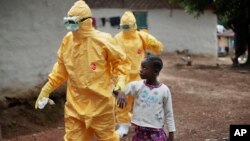Sub-Saharan African countries have made relatively small, but “vitally important,” contributions towards the fight against Ebola according to the U.N. Mission for Ebola Emergency Response. This includes sending much-needed health care workers and medical supplies, as well as dedicating already-limited resources toward prevention and surveillance measures within their own borders to stop the further spread of the disease.
More than 850 doctors and nurses from African countries have been deployed to Guinea, Liberia and Sierra Leone to help bring an end to West Africa’s Ebola outbreak, which has killed more than 8,500 people since it began nearly a year ago.
African countries also have collectively donated tens of millions of dollars in financial aid and material resources.
“One of the biggest contributions the African nations have made is doctors," U.N. Mission for Ebola Emergency Response spokesperson Fatoumata Lejeune-Kaba said. " It is not easy for people to decide to come and fight Ebola right where they can get infected.
"It is all good to have facilities and to send ambulances -- those are very important in the fight against Ebola. But you also need people to bury the dead, to dig the graves, to follow the contacts, and those that are at the forefront doing that are the nationals themselves," Lejeune-Kaba added.
'Tremendous' response
The African Union Support to Ebola in West Africa says they plan to deploy at least 1,000 volunteers and health workers from African countries.
Nigeria has sent 250 health care professionals to the three most affected countries. Ethiopia has deployed 187. The Democratic Republic of Congo, 82. Earlier this month, Kenya sent 170 doctors.
The Director of Socials Affairs for the African Union, Olawale Maiyegun, said the response by Africans in the fight against Ebola has been “tremendous.”
“There has been a lot of, what we call, African solidarity: Africans helping Africa. And it should not go unnoticed. You must remember, in Africa, we do not have enough health or human resources," said Maiyegun. "So to recruit 1,000 volunteers has been a huge challenge, but…You cannot put any price tag on human resources. It’s the most valuable resource helping us to fight against Ebola.”
Many countries also have contributed in ways that can not necessarily be quantified with a price tag.
Integrated approach
Senegal, for example, opened a humanitarian corridor, to allow for the movement of people and supplies into and out of the affected counties. Ghana serves as a logistics hub and headquarters for the U.N. mission.
Kaba said other West African countries, particularly those that neighbor the most-affected countries, have since spent money on putting in place border control surveillance, launching Ebola public awareness campaigns, training health workers and pre-positioning supplies.
“So that is one of the major contributions of African countries. There is also the countries involved themselves that have devoted part of their budgets towards the fight against Ebola, and this is at the expense of other investments that they would have made in their countries if the Ebola outbreak had not taken place.”
The United Nations says Nigeria, which saw 20 cases of Ebola last year, has donated more than $3.5 million towards Ebola response in Guinea, Liberia and Sierra Leone. Other countries, such as Cote d’Ivoire, Namibia and Kenya, each have donated $1 million to Guinea, Liberia and Sierra Leone.
South Africa has given more than $300,000, along with donating medical supplies -- such as PPE suits and ambulances, helping build a 40-bed treatment center, and training nearly 100 health workers from 16 countries.
More than a dozen health care workers from South Africa will leave for Sierra Leone later this week.
In November, more than 60 local African businesses pledged $28.5 million to fight Ebola.
Ethiopia launched a campaign in December that allows individuals from the private sector, who are not doctors or nurses but want to help, to donate towards Ebola response via SMS. Burundi, Chad, the Central African Republic, Ghana, Kenya, Lesotho, Senegal, Tanzania, Zambia and Zimbabwe have similar programs.




